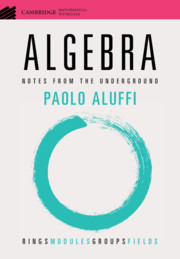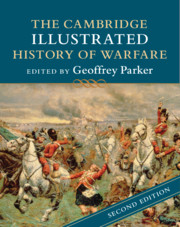Refine search
Actions for selected content:
36807 results in Cambridge Textbooks
5 - Binomial and Multinomial Coefficients
-
- Book:
- An Invitation to Combinatorics
- Published online:
- 16 September 2021
- Print publication:
- 22 July 2021, pp 147-192
-
- Chapter
- Export citation
9 - Generating Functions
-
- Book:
- An Invitation to Combinatorics
- Published online:
- 16 September 2021
- Print publication:
- 22 July 2021, pp 292-360
-
- Chapter
- Export citation
Reviews
-
- Book:
- Modern Communications
- Published online:
- 18 August 2021
- Print publication:
- 22 July 2021, pp ii-ii
-
- Chapter
- Export citation
15 - Porous Media
-
- Book:
- Biofluid Mechanics
- Published online:
- 19 November 2021
- Print publication:
- 22 July 2021, pp 472-506
-
- Chapter
- Export citation
References
-
- Book:
- Biofluid Mechanics
- Published online:
- 19 November 2021
- Print publication:
- 22 July 2021, pp 582-598
-
- Chapter
- Export citation
Dedication
-
- Book:
- International Law
- Published online:
- 01 July 2021
- Print publication:
- 22 July 2021, pp v-vi
-
- Chapter
- Export citation
22 - International Organisations
-
- Book:
- International Law
- Published online:
- 01 July 2021
- Print publication:
- 22 July 2021, pp 1133-1176
-
- Chapter
- Export citation
10 - The Discriminant
- from Part II - The Theory of Fields and Galois Theory
-
- Book:
- Galois Theory and Its Algebraic Background
- Published online:
- 05 August 2021
- Print publication:
- 22 July 2021, pp 122-125
-
- Chapter
- Export citation
Preface
-
- Book:
- Law and Administration
- Published online:
- 06 July 2021
- Print publication:
- 22 July 2021, pp xvii-xx
-
- Chapter
- Export citation
Table of European Union Law and the European Convention on Human Rights
-
- Book:
- Law and Administration
- Published online:
- 06 July 2021
- Print publication:
- 22 July 2021, pp lviii-lx
-
- Chapter
- Export citation
3 - Kinematics, Lagrangian and Eulerian Variables
-
- Book:
- Biofluid Mechanics
- Published online:
- 19 November 2021
- Print publication:
- 22 July 2021, pp 45-82
-
- Chapter
- Export citation
2 - Integral Domains
- from Part I - The Algebraic Background
-
- Book:
- Galois Theory and Its Algebraic Background
- Published online:
- 05 August 2021
- Print publication:
- 22 July 2021, pp 25-53
-
- Chapter
- Export citation

Algebra
- Notes from the Underground
-
- Published online:
- 19 July 2021
- Print publication:
- 03 June 2021
-
- Textbook
- Export citation

Design Optimization using MATLAB and SOLIDWORKS
-
- Published online:
- 17 July 2021
- Print publication:
- 29 April 2021
-
- Textbook
- Export citation

The Cambridge Illustrated History of Warfare
-
- Published online:
- 15 July 2021
- Print publication:
- 15 July 2021
-
- Textbook
- Export citation
8 - The Conquest of the Americas 1500–1650
- from PART III - The Age of Guns and Sails
-
-
- Book:
- The Cambridge Illustrated History of Warfare
- Published online:
- 15 July 2021
- Print publication:
- 15 July 2021, pp 138-153
-
- Chapter
- Export citation
PART III - The Age of Guns and Sails
-
- Book:
- The Cambridge Illustrated History of Warfare
- Published online:
- 15 July 2021
- Print publication:
- 15 July 2021, pp 124-125
-
- Chapter
- Export citation
Boxes
-
- Book:
- Early Medieval Britain, c. 500–1000
- Published online:
- 04 August 2021
- Print publication:
- 15 July 2021, pp xiii-xiv
-
- Chapter
- Export citation
Contents
-
- Book:
- Beyond CLIL
- Published online:
- 22 June 2021
- Print publication:
- 15 July 2021, pp v-vi
-
- Chapter
- Export citation
4 - The Mechanics of Deeper Learning
- from Part II - Pluriliteracies: Building a Pedagogical Approach for Deeper Learning
-
- Book:
- Beyond CLIL
- Published online:
- 22 June 2021
- Print publication:
- 15 July 2021, pp 42-85
-
- Chapter
- Export citation
